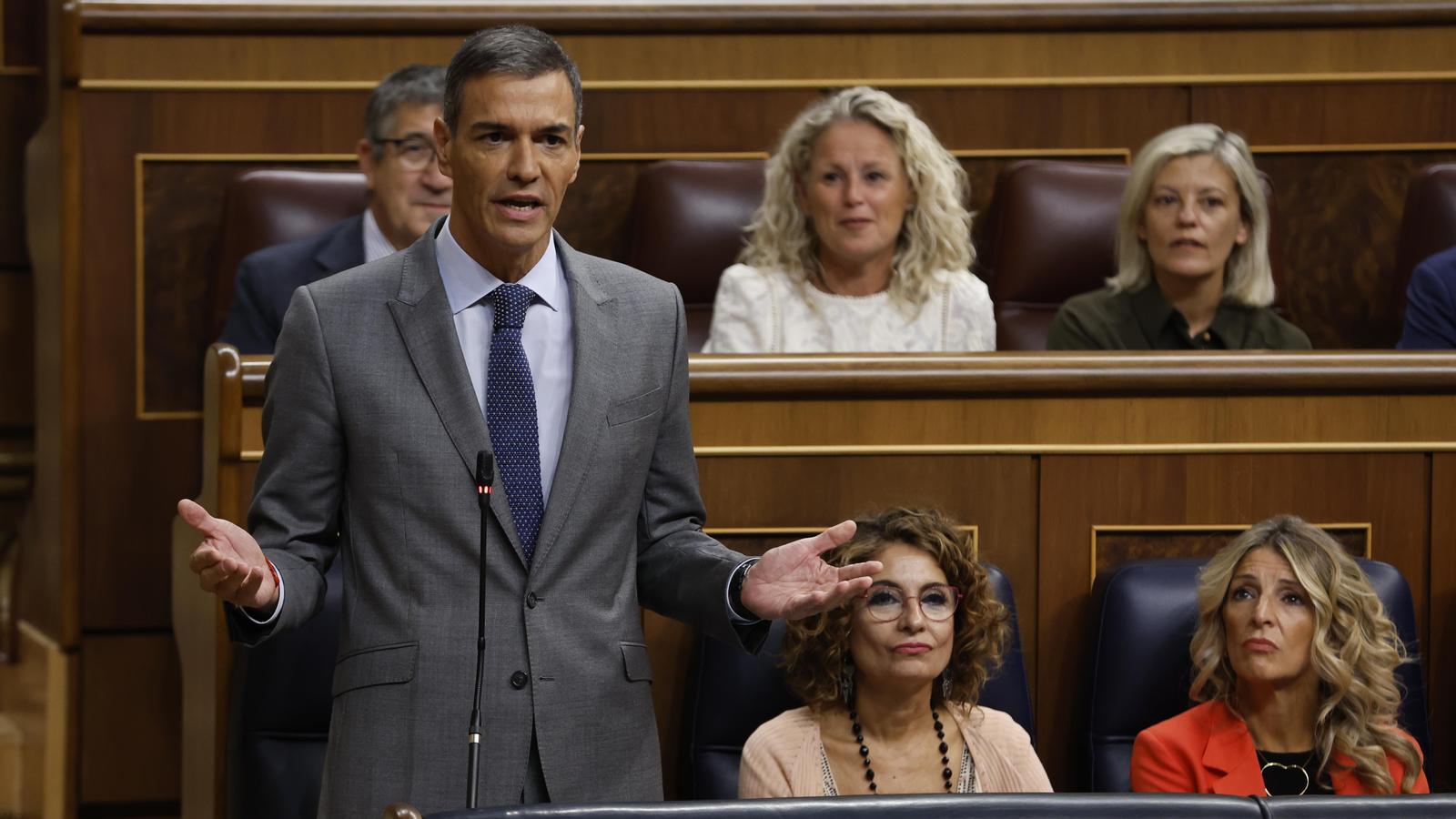Sánchez balances Trump's proposal in Gaza and Feijóo endorses him
Consum will investigate Spanish companies doing business in the occupied Palestinian territories.

Barcelona / MadridSpanish Prime Minister Pedro Sánchez welcomed the peace plan negotiated on Monday. Donald Trump and Benjamin Netanyahu to end the war in Gaza. Following the two leaders' announcement, Sánchez celebrated the beginning of a possible solution on social media: "We must put an end to so much suffering," he wrote. Sources at the Moncloa (Ministry of Justice) point out that this does not mean that Sánchez endorses or shares Trump's plan, but rather that he simply sees the opening of the path to dialogue as a positive development. The PP, on the other hand, does support the proposal, while Sumar openly distances itself from it.
In a statement, Sumar's ministers have taken a stand, denying that it is a peace proposal. "It is an imposition. It is deeply worrying that they are attempting to resolve the conflict by ignoring the Palestinian population," argued Yolanda Díaz's ministers. "The idea of a supervised 'transition' under the control of the United States and without political guarantees for the Palestinian people is nothing more than an attempt to consolidate the status quo of employment and violence that denies fundamental rights," believes Sumar, who emphasizes that "a peace process cannot be built on military threats or the exclusion of one of the parties." According to Sumar, this is an agreement that "perpetuates the imbalance" and "legitimizes Israel's impunity after a genocide that has already lasted two years."
Sources from the Moncloa do not address why the minority party in the Spanish government has wanted to analyze the substance of the plan, something that for now the social sector believes is similar. "The spirit" of what the two parties in the Spanish government support. In fact, in the tweet to X, Sánchez already emphasizes that we must work toward a two-state solution. For its part, Podemos has attacked the Spanish prime minister for welcoming a proposal that the purple party "outright rejects" because it sees it as "a colonization plan 2.0."
The leader of the People's Party (PP), Alberto Núñez Feijóo, considered that the US president proposes a "realistic path" to end the conflict. "Without Hamas, without annexations, with the support of the Arab countries and a Palestinian technocratic government," he added, in a message to X. In statements to the Senate, Feijóo criticized that "Sánchez does not govern his government and Díaz does not govern her party." "This is a hypocritical mismanagement" because "each one is doing what is in their interest for their electorate and what matters least to them is Spain's international solvency," he said. "The plan is a solid hope for peace," reiterated Feijóo, who sees it as "the opportunity" to "stop this nonsense that is taking place in the Middle East" and hoped that "it comes to fruition."
Consumer surveillance
Meanwhile, the Ministry of Social Rights, Consumption, and the 2030 Agenda has announced that it will investigate companies in Spain that advertise services provided or products manufactured in the Palestinian territories occupied by Israel. Consum's measure stems from the Royal Decree approved last week to adopt urgent measures against the genocide in Gaza and to support the Palestinian population. The ministry's announcement does not specify which companies are involved, nor does it refer to products and services from Israeli settlements in the West Bank.
Article 4 of the Royal Decree-Law prohibits the advertising of goods and services from these occupied territories, with the aim of limiting the possibility of developing this business. In accordance with the Digital Services Regulation, Consum may request the removal or blocking of access to this illegal content. Furthermore, from a sanctioning perspective, these practices will be considered unfair commercial practices. This means that anyone who engages in these practices faces severe sanctions under consumer law, of up to 100,000 euros or between four and six times the illicit profit.
Based on this, the Directorate General of Consumer Affairs will investigate companies that are allegedly taking advantage of this practice, as noted in the report published in July by Francesca Albanese, UN Special Rapporteur for the Occupied Palestinian Territories, entitled "From the Economy of Employment to the Economy of Genocide." The Basque construction company CAF appears in Albanese's report. The UN subsequently included Florentino Pérez's ACS and the Spanish public company Ingeniería y Economía del Transporte (Ineco) in its updated blacklist of companies with ties and business relationships with Israeli settlements. Nearly 70 more companies have been added to a blacklist of companies from eleven countries that are "complicit in the violation of Palestinian human rights through their business ties to Israeli settlements in the occupied West Bank," according to the UN.
"Bloodstains"
The minister already announced in July, during the presentation of the event Alliances and actions against the genocide in Palestine, which would provide "all necessary resources" to ensure "that no company operating in Spain has its profit and loss accounts stained with the blood of the Palestinian people." With this announcement, the minister aims to guarantee that "any company operating in Spain abandons all operations linked to Israeli employment, whether directly or indirectly."
The ministry headed by Pablo Bustinduy believes that maintaining this service offering in Spain contributes to "perpetuating Israel's colonial efforts and genocide." Businesses that profit from employment are considered an illegal activity under international law, and, as Albanese's report notes, the Netherlands Prosecutor's Office is investigating complaints about this activity for possible violations of money laundering regulations.
